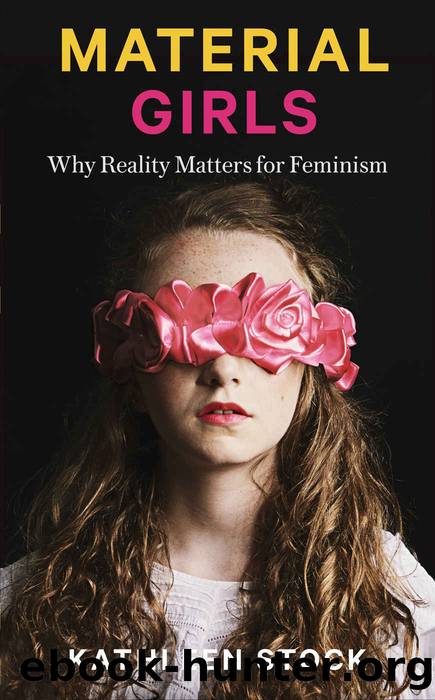Material Girls: Why Reality Matters for Feminism by Stock Kathleen

Author:Stock, Kathleen [Stock, Kathleen]
Language: eng
Format: epub
Tags: retail, nonfiction, feminism, culture, transgender, lgbt
ISBN: 9780349726595
Publisher: Little, Brown Book Group
Published: 2021-05-06T00:00:00+00:00
WOMAN as a social role
In the first chapter, I introduced an idea with a powerful attraction for many feminists over the years: the idea that WOMAN refers to those expected by society to perform a âfeminine social roleâ. What this means, spelled out, is usually a bit vague, but itâs something like: a woman, by definition, is any adult human expected to occupy or perform a set of behaviours stereotypically associated with the female sex, and/ or who is interpreted by society in terms of a set of female-associated stereotypes and norms. So women, by definition, are the people expected to look after children, do most of the housework, take lower paid jobs than their partners, speak more submissively, be good listeners and be caring. They are, by definition, the people who tend to be lauded as virginal or as motherly, or castigated as whores or as witches; who are easily thought of as bitches, or bossy, or slutty, or frigid, or girly, or bubbly, or feisty (etc., etc.).
In the twenty-first century this view, which Iâll call âWOMAN-as-socialâ or WAS for short, has become associated in some minds with a justification for the claim that âpassingâ trans women are women. Passing trans women are defined as those male people who, as a result of surgery and taking hormones, eventually cannot be perceptually distinguished from adult human females by most people. Sometimes these are distinguished from other trans women by being called âtranssexualsâ. If a transsexual trans woman passes, it is assumed by many that she must be subject to the same expectations and norms of femininity as are typically projected upon adult human females, and that this is what âmakesâ her a woman. Passing trans men are considered to be men for similar reasons.
This sort of view is often accompanied, with an implied âtadaah!â, by the quote from Simone de Beauvoir we saw in Chapter 1: âOne is not born, but rather becomes a womanâ (alternatively: âA woman is not born but madeâ). The fact that in The Second Sex de Beauvoir was fairly obviously talking only about females and their involuntary encounters with a social system subjecting them to impossible ideals of femininity from birth seems mostly ignored. De Beauvoir wasnât talking about males who decide after puberty to radically alter their bodies artificially, and nor would she have excluded from the purview of her claims any trans man who did similar. Still, whatever the case, her quote has found new life in a modern context.
WAS and gender identity theory are competitors. Effectively, each offers a different conceptual analysis of WOMAN and MAN. According to contemporary trans activists â or at least, the consistent ones â WAS is, like the traditional versions of WOMAN and MAN, âexclusionaryâ, since it cannot accommodate the claims of non-passing trans women to be women, or of non-passing trans men to be men. WAS is also criticised for having nothing to say about non-binary people. Still, for many others â and in particular people
Download
This site does not store any files on its server. We only index and link to content provided by other sites. Please contact the content providers to delete copyright contents if any and email us, we'll remove relevant links or contents immediately.
| Anthropology | Archaeology |
| Philosophy | Politics & Government |
| Social Sciences | Sociology |
| Women's Studies |
On the Front Line with the Women Who Fight Back by Stacey Dooley(4314)
The Lonely City by Olivia Laing(4122)
The Rules Do Not Apply by Ariel Levy(3909)
Bluets by Maggie Nelson(3718)
The Confidence Code by Katty Kay(3570)
Three Women by Lisa Taddeo(2922)
Inferior by Angela Saini(2838)
A Woman Makes a Plan by Maye Musk(2838)
Pledged by Alexandra Robbins(2796)
Not a Diet Book by James Smith(2730)
Confessions of a Video Vixen by Karrine Steffans(2678)
Nice Girls Don't Get the Corner Office by Lois P. Frankel(2597)
Wild Words from Wild Women by Stephens Autumn(2589)
Brave by Rose McGowan(2506)
The Girl in the Spider's Web: A Lisbeth Salander novel, continuing Stieg Larsson's Millennium Series by Lagercrantz David(2383)
The Clitoral Truth: The Secret World at Your Fingertips by Rebecca Chalker(2246)
Why I Am Not a Feminist by Jessa Crispin(2241)
Women & Power by Mary Beard(2228)
Women on Top by Nancy Friday(2128)
